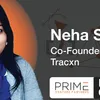Investor-author Sukhinder Singh Cassidy on taking smart risks and hiring right people for it
In this episode of Prime Venture Podcast, Sukhinder Singh Cassidy, Founder and Chairman, theBoardlist, talks about smart risk-taking and balancing gut feeling and data in decision-making.
Sukhinder Singh Cassidy, Founder and Chairman, , is an investor and a board member with over 25 years of industry experience.
She believes the secret to her success lies in the incremental smart risks she has taken during her journey.
In her book, Choose Possibility, she highlights there is no one big risk needed to get that one big reward. The big reward is ultimately a cumulation of the small risks taken, in combination with an effective feedback loop.
Sukhinder has worked in Amazon and Google. She has founded and worked with three startups and contributed to multiple boardrooms. Smart risk-taking is her mantra and the only advice she has for early-stage entrepreneurs.

Representational Image
Taking risks as a founder
Sukhinder says if you have founded a company, you have already chosen a new possibility and taken a risk.
“But it is a mistake to think the choosing and risk-taking were one-time events,” she explains, adding that the path between risk and reward is a non-linear journey.
You will fail multiple times, have few small wins until that big day when you have the product-market fit. Once you are inside the journey, it is important to have a feedback mechanism. You must evaluate every small risk you take before stepping into the next one.
“Ask yourself – what are the smart risks I should be taking? What are the risks I should not be taking?
Understanding both will transform you into a smart risk-taker, and you will find that big success,” says
Sukhinder.
Building a risk-taking team
During her time spent in boardrooms, Sukhinder repeatedly found that the founders took all the risk. But, a company only succeeds when the team around the entrepreneur pitches in and takes smart risks, she says.
Her advice is, “Think how do I train my people to take smart risks? How do I enable my team to take ownership and author the progress of my company?”
In this context, she lays out her framework for hiring a risk-taking team.
“First, look for diverse skillsets. Avoid homogeneity inside your company at all costs. Second, welcome people who are agile, people who have worked both in big and small companies and are not afraid to make the shift. Third, hire people who have visions, who do not simply walk into rooms to follow your idea. You cannot scale your company if no one but you has an agenda for meetings,” she explains.
How to evaluate a person’s ability to take risks?
“Look at the resumes,” says Sukhinder. While interviewing your candidates, you need to see if the person has taken any risk to learn a new skill, can the person quantify the impact they had had over their career, and can the person list down their failures.
“From there on, it is all about probing the candidate to reveal more details around the answers. You will then have your smart risk-taking team,” says Sukhinder.
Evaluating one’s risk-taking appetite
For founders who need to introspect their ability to take risks, Sukhinder advises them to test themselves in the macro-setting.
“Where do you fit in the equation, and how will the risk impact the macro-environment around you?” she says.
She adds that entrepreneurs should work with three to five years goals instead of that big idea. This will help them to take a risk, evaluate the impact, redefine the next risk, and run the loop again.
“Choice-making, impact, choice-making – that is the cycle you should follow. Your incremental risks running in a feedback loop will compound to bring success,” Sukhinder says.
To know more, listen to the podcast here.
Timestamps:
01:00: Risk-taking as an early-stage startup founder.
06:50: How to train your team to take risks?
11:30: Evaluating risk and reward when joining a startup.
21:45: How to rent the mind that you can’t afford to hire?
27:30: How should board members help founders?
31:30: Think Gut-Data-Gut NOT Gut versus Data.
36:00: How to write a book about principles?
YourStory’s flagship startup-tech and leadership conference will return virtually for its 13th edition on October 25-30, 2021. Sign up for updates on TechSparks or to express your interest in partnerships and speaker opportunities here.
For more on TechSparks 2021, click here.
Edited by Suman Singh








